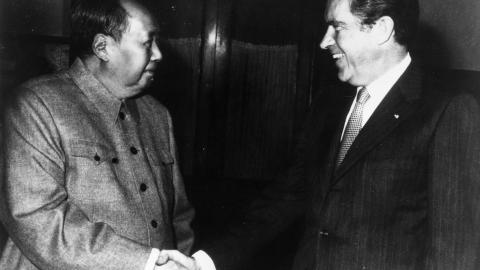In a lengthy phone conversation last week with China’s communist leader, President Trump accepted Xi Jinping’s invitation to visit Beijing soon. The U.S. president wants to use such a summit to solve specific problems with China, including fentanyl, rare earth materials and tariffs, and the Chinese Communist Party leader seeks to “reset” the entire U.S. policy toward the CCP.
For Mr. Xi, such summits are not instruments of negotiation or goodwill. They are weapons of narrative warfare — scripted performances designed to deceive, demoralize and dominate. The stakes are not merely symbolic. Every meeting staged on the CCP’s terms reinforces a regime bent on reshaping the global order in its authoritarian image.
Summits, especially those held in China’s imperial capital city, have long been part of the CCP’s playbook for consolidating power at home and projecting strength abroad. Mao Zedong weaponized President Nixon’s 1972 visit to mask the devastation of the Cultural Revolution and restore his crumbling legitimacy. In 1978 and 1979, Deng Xiaoping successfully and cunningly played the “U.S. card” by manipulating the gullible President Carter into projecting him as the “paramount leader” of the CCP while Mr. Deng was immersed in a fierce but unsettled internal power struggle. After the bloodshed at Tiananmen Square in 1989, Chinese leaders again used American presidential engagements to legitimize their grip on power and whitewash atrocities. Mr. Xi is simply recycling this model with higher production value and greater ambition.
Today, Mr. Xi faces a firestorm of his own making. His “zero-COVID” policy crippled the economy. His crackdown on private enterprises has driven away innovation and capital. Youth unemployment has soared. The property market teeters on collapse. The once-fabled “Chinese growth miracle” now limps behind a wall of state propaganda. A growing number of Chinese citizens see through the myth of infallibility, and Mr. Xi knows it. That is why a summit with the American president is so critical. It’s not about diplomacy. It’s about survival.
To the Chinese people, the sight of the U.S. president standing shoulder to shoulder with Mr. Xi will be broadcast as evidence that their leader is unchallenged and revered on the global stage. The CCP will flood its tightly controlled media with images of statesmanship and applause, burying domestic discontent under a mountain of nationalist spectacle. Mr. Xi is not seeking conversation; he is manufacturing consent.
The illusion doesn’t stop at China’s borders. This summit is aimed squarely at America’s Asian allies: Japan, South Korea, the Philippines, Taiwan, India and Vietnam. These nations, all under increasing pressure from Beijing’s military and economic coercion, look to Washington as the sole counterweight to Chinese aggression. When the U.S. president appears in Beijing, smiling and shaking hands with the very man who threatens regional peace, it sends a chilling message: America is not serious. America can be wooed. America will appease.
Worse still, this entire pageant follows a familiar Chinese tactic: to escalate tension and then offer “cooperation” as the antidote. It’s a strategy born not of statesmanship but of Leninist manipulation. China raises the temperature — buzzing U.S. aircraft, intimidating Taiwan, harassing ships in the South China Sea — and then extends a diplomatic olive branch to an anxious Washington. The desired outcome? Strategic concessions, rhetorical softening or mere moral equivalence.
The ploy is remarkably effective. Previous U.S. administrations have leaped at the chance to establish crisis hotlines, resume dialogues or sign vague communique. Still, Beijing has a habit of ignoring those very hotlines when crises erupt. During the 1999 bombing of the Chinese Embassy in Belgrade and the 2001 EP-3 spy plane collision, Chinese generals simply refused to pick up the phone. These mechanisms exist not for crisis resolution but for public relations. They are bait, and Washington keeps biting.
What makes this cycle even more dangerous is the fundamental asymmetry in how the two nations approach diplomacy. America operates in the realm of the tangible: Identify the problem, negotiate the terms, implement the solution. China operates in the realm of perception, ideology and power. Each summit is not a forum; it’s a stage. Each conversation is not a dialogue; it’s a sermon. The message is always the same: The West is declining, America is to blame, China is the victim, and only the CCP, through the infallible wisdom of Mr. Xi, can lead the world to order and stability.
This is not diplomacy. It’s deception. Previous American administrations kept mistaking it for progress.
If Mr. Trump walks into Beijing with anything less than unshakable clarity and unyielding resolve, he risks becoming a prop in a much larger performance. Mr. Xi doesn’t need a win at the negotiating table. He needs a photograph, a quote, a gesture — something that can be packaged and broadcast to 1.4 billion people as proof that the world still bows to Zhongnanhai, the Chinese equivalent of the Kremlin.
Worse, if the summit is framed as a “reset” or a diplomatic breakthrough, it will embolden China and rattle U.S. allies, weaken deterrence and invite more aggression. The CCP reads softness as surrender and smiles as weakness. History offers no shortage of warnings, yet the lesson remains ignored: Summits on Mr. Xi’s terms serve the party, not peace.
The contest between the United States and China is not a misunderstanding to be resolved over tea and handshakes. It is a confrontation between two irreconcilable systems — one rooted in freedom, transparency and law, the other in control, surveillance and brute power. If the United States fails to recognize this, if it continues to indulge in the fantasy that diplomacy alone can tame a regime built on lies and fear, it will lose far more than face.
The stakes are too high for wishful thinking. The summit in Beijing is not a chance for detente. It is a test of will, and both sides must understand it.














